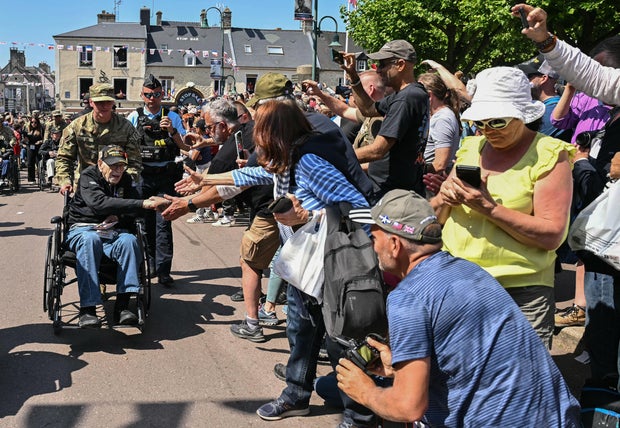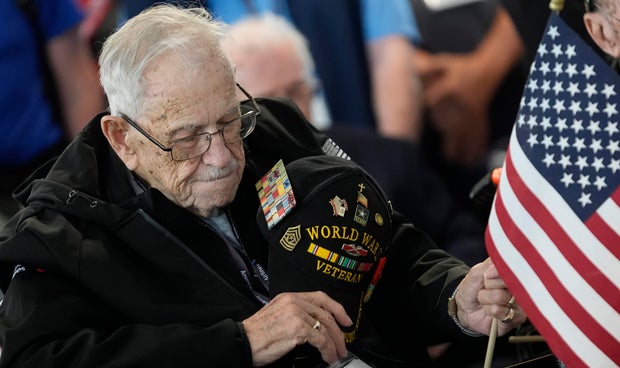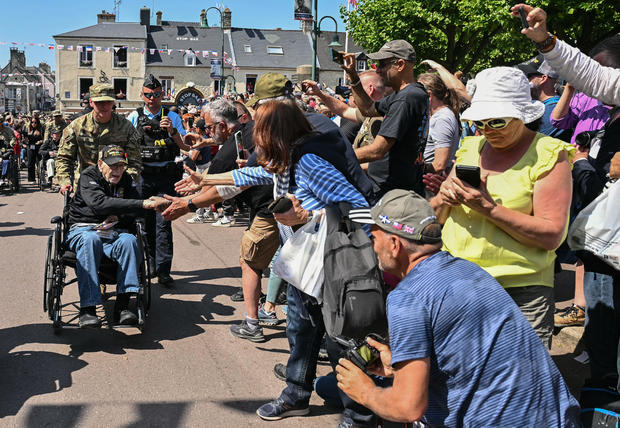Collville-sur-Mer, Normandy, France — The word “hero” is overused. But if not for the courage of the few remaining D-Day survivors and their friends who fell as they launched the fight to oust Adolf Hitler’s Nazi German forces from France 80 years ago, there would have been no celebrations this week in Normandy.
With each passing year, living testimony of the hell those Allied forces endured in the name of freedom is fading.
“We cannot allow what happened here to be lost in the years that come,” President Biden said Thursday at a D-Day memorial event in the Normandy American Cemetery, where more than 9,300 fallen U.S. troops are buried.
Command Sergeant Major Henry C. Armstrong, was among the D-Day veterans honored this week. He’s 99 years old now, but the last time he was here, he landed off-shore on a barge as a young corporal in the U.S. Army, and he had to fight his way off the beach under relentless German fire.
“We were fighting all the way in,” he said. “I don’t know how far in we got and how far down we got, but, it was late in the afternoon.”

MIGUEL MEDINA/AFP/Getty
“That night we were trying to get some sleep… A shell went off over our heads and it lit up like daylight,” he recalled to CBS News. “You’ve got to figure, I was 19 at the time, and a lot of the guys were that age, and we were scared to death — kids, of course.”
But for the sake of the men serving under him, Armstrong said he put on a brave face.
“You have to do it that way. You have to. You have to realize that these men depend on you, you know?” he said, adding: “It’s not that I was any different than them or anything else, you know, it was just that, we worked together as a team.”
Military service runs in the family. Armstrong was accompanied for Thursday’s memorial ceremonies by his great-grandson, U.S. Army Staff Sergeant Tanner Armstrong, who’s still on active duty.
Having served in Iraq and Afghanistan the younger Armstrong is no stranger to combat, but asked if he could imagine what his great-grandfather went through as he landed on Omaha Beach 80 years ago, he didn’t hesitate:
“I absolutely cannot,” he said. “There was, who knows how many ships out here… The amount of manpower they used just in this area — it’s unbelievable, and probably won’t be matched again.”
The elder Armstrong and his men went on to liberate Paris, and then they marched into Germany. He helped liberate a concentration camp and witnessed atrocities too brutal to detail here.

LM Otero/AP
Armstrong spent 41 years in the U.S. military. He served through the rest of WWII, the Korean War and then Vietnam. His life has been lived in service of his country.
“We love him to death,” his great-grandson told CBS News. “We’re so proud of him.”
Armstrong said it was wonderful to be able to return to Normandy 80 years later and that, “in a sense, it’s a good memory — but then in a sense, it’s a sad memory.”
He said it was painful to “realize when I came ashore, a lot of the others came ashore – a lot of the others didn’t make it.”
Armstrong said he would never forget those men who couldn’t make it off Omaha Beach, and never forget what happened here.
Neither can we.
Charlie D’Agata 
Charlie D’Agata is a CBS News senior foreign correspondent and has been based in London since 2000. He’s spent more than two decades covering international news for CBS.
